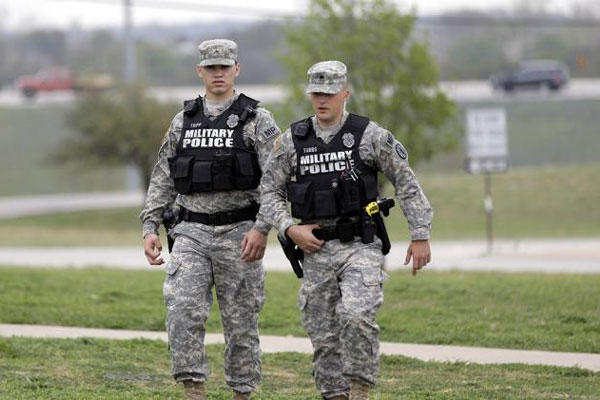An Army investigation cleared the commanders of failing to monitor a soldier who killed three soldiers and himself and wounded 12 at Fort Hood, Texas, last April.
The Army lacked a system for alerting commanders to the threat posed by Spec. Ivan Lopez under treatment for depression before his shooting rampage on Fort Hood, the investigation concluded Friday.
Investigators recommended that the Army should require soldiers to register their privately-owned weapons on base to give commanders the ability to monitor those who may be a danger to themselves and others.
The months-long Article 15-6 investigation under the Uniform Code of Military Justice found that no "single event or stressor, in isolation, was the cause of the shooting" last April at the sprawling base in Texas by Spec. Ivan Lopez.
Using his personal .45 caliber Smith & Wesson automatic handgun, which was not registered with the base, the Lopez fired at least 37 times while moving about over a two-block area.
Army Sgt. Timothy Owens of Illinois; Staff Sgt. Carlos Lazaney Rodriguez of Puerto Rico; and Sgt. 1st Class Daniel Ferguson of Florida were killed and 12 others were wounded in the hail of bullets. Lopez then turned the weapon on himself when he was confronted by a military police officer.
Lt. Gen. Joseph E. Martz, who led the investigation, wrote that "we find no indication in his medical and personnel records suggesting (Lopez) was likely to commit a violent act."
At the time of the shootings, Lopez, originally from Puerto Rico, was taking multiple prescription drugs and sleep aids for anxiety and depression, and had recently seen a military psychiatrist who said he was not a risk. He was also undergoing diagnosis for Post Traumatic Stress Disorder (PTSD).
Although there were "no clear warning signs" of the danger, Martz's investigation said there were "several factors that may have contributed to the soldier's state of mind. He recently experienced the death of two close family members, was facing financial difficulties, and was being treated for several medical conditions."
Lopez' chain-of-command "would have had difficulty in recognizing personal problems, or providing help that may have been needed," the investigation said. "Since risk assessment tools depend on self-reporting, they are subject to the soldier's willingness to identify risk factors accurately," and Lopez could be "misleading or deceptive," the investigation said.
Commanders also may not have had the time to deal with Lopez' personal problems, the investigation said.
When Lopez arrived at Fort Hood, his unit was experiencing "significant turnover in leadership," and was facing "high operational tempo" and personnel shortages. Leaders may have been "unable to provide adequate time to train, mentor, and lead" a depressed soldier, the investigation said.
Lopez, a married father of four, had only been assigned to Fort Hood in early 2014 and had been working as a truck driver.
"In the absence of a system capable of identifying (Lopez) as a threat, and because the unit was unaware and unable to address the variety of stressors in (his) life, Fort Hood was not able to prevent the shooting," Martz concluded.
Martz recommended that the Army examine whether soliders "should be required to register personally-owned weapons with their command." Lopez had bought two weapons at local gun shops in the weeks prior to the shootings without the knowledge of his leadership, the investigation said.
Lack of information on personal weapons "impacts a commander's ability to maintain situational awareness over a service member and their actions involving a firearm that could be concealed and brought onto the installation for unauthorized purposes," the investigation said.
At a Senate hearing on the shootings last year, Army Secretary John McHugh said that Lopez had been "fully examined" for depression by a military psychiatrist and "we had no indication on the record of that examination that there was any sign of likely violence, either to himself or to others -- no suicidal ideation."
Lopez also "had a clean record" in the military, and background checks showed "no involvement with extremist organizations of any kind," McHugh said.
He added that "we try to do everything we can to encourage soldiers to register their personal weapons, even when they live off post. We are not legally able to compel them to register weapons when they reside off post."
Commanders have been arguing for years for more authority to intervene in cases where mentally-troubled troops have access to personal weapons in an effort to curb the military suicide rate. About half of the suicides in the military involve personal weapons, according to Defense Department statistics.
-- Richard Sisk can be reached at richard.sisk@military.com



























